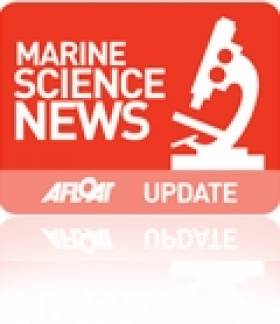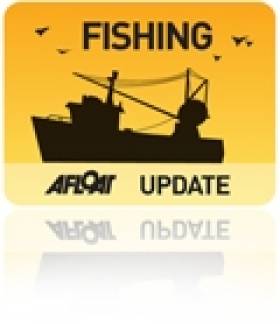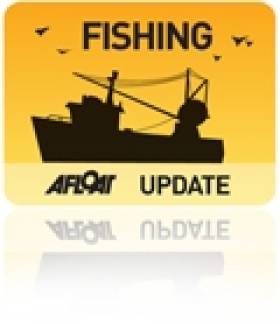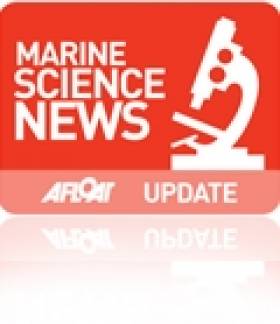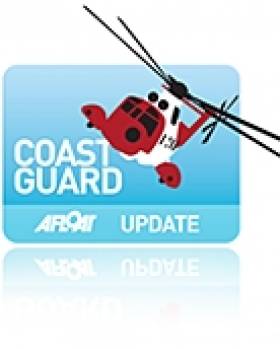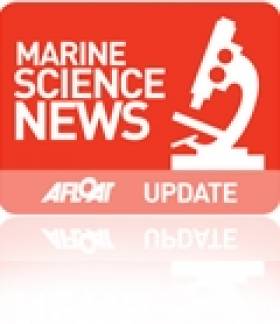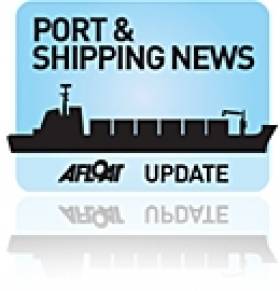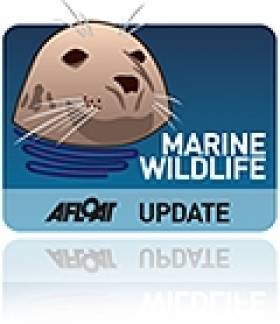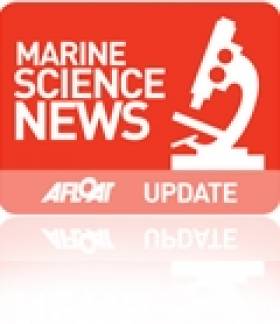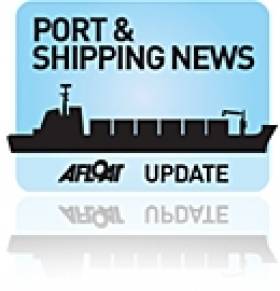Displaying items by tag: Marine Institute
Students Take to the High Seas
Imagine being able to plan, design and carry out your own scientific survey into the seas around us. Last week research students from across Europe were given just such an opportunity when they joined scientists onboard the Irish national research vessel RV Celtic Voyager in waters off Cork.
This unique opportunity for students to gain practical experience in carrying out multidisciplinary marine scientific research is part of the European Framework 7 project EUROFLEETS, and was designed, developed and co-funded by the Marine Institute, Ireland.
Over the course of six days, between the 14th and 19th August, 20 European postgraduate students learned the skills necessary to map the seabed, identify the animals and plants living there, and investigate the local and oceanic currents that influence them. Training focused specifically on operational research and included the deployment of equipment and instrumentation, sample recovery and processing, and data acquisition. Other modules investigated designing and planning a survey, operations and capabilities of research vessels and safety at sea.
Former Obama Adviser sees a "Rebirth" in the Use of Industry Information to Guide Scientists
Dr. Peter Heffernan (Marine Institute) with Martin Pastoors (IMARES, The Netherlands) and Dr. Steve Murawski (NOAA, USA) at the Conference. (Photo: Marine Institute).
The Conference - "Fisheries Independent Information, Galway 2010" – not only explores how information gathered at sea by fishermen can better contribute to fish stock assessments, management and policy but critically, how the vast amount of experience and traditional knowledge accumulated by the fishing industry can be harnessed in sustainable management strategies.
Speaking on the first day of the event Dr. Steve Morawski, former senior advisor for the National Oceanic and Atmospheric Administration to President Obama's Ocean Policy Task Force and the current Chief Science Advisor to NOAA Fisheries, USA said that in spite of past concerns regarding the reliability of fishery-dependent data, we are in the midst of a "rebirth" in the use of information from industry to inform stock assessment and the management of catch and by-catch allowances.
"Fortunately, great advances have been made in methods for collection and analysis of fishery-dependent data and we have experienced encouraging success in working with stakeholders to collect this type of data," he said.
Some 30 countries from across the globe are represented at the conference, which features 81 oral presentations and 50 poster displays covering the entire spectrum of fishing, from small scale artisinal fisheries right up to large scale industrial operations engaged across the world's oceans and inland waters.
Opening the conference, Dr. Peter Heffernan of the Marine Institute said that, while Ireland had made significant progress in bringing scientists and fishers together through the formation of the Irish Fisheries Science Partnership, he was keen to learn how such initiatives had worked elsewhere and what we could learn from others. "Innovation is the key element to this conference," he said, "technical innovation in the development of new data collection tools and data integration, but also through innovative thinking and co-operation in how we can marry together traditional and non-traditional information."
According to the International Labour Organisation (ILO) the capture fishing industry employs some 27 million people worldwide (including full-time, part-time and occasional fishers). In Europe, the European Commission estimates that some 141,000 people are employed in the fishing sector which produces over 6.5 million tonnes of fish between the catching and aquaculture industries.
"Fishermen and scientists have an enormous amount that they can contribute to each other," said Lorcan O'Cinneide, CEO of the Irish Fish Producers Organisation in his keynote address earlier today (Tuesday 24th August). "It is essential for the future that the integration of such information can be brought to the centre of the scientific and advice process in a manner that has the necessary rigour to be credible and useful to analysis."
Marine and inland fisheries are of particular importance to developing countries where ILO estimates that over 94% of the world's fishers live (Asia 83%, Africa 9% and South America 2.5%). In these countries fish is not only an important source of protein for many communities, but also an important part of global trade. The role that fishers and their knowledge play in ensuring a sustainable "ecosystem approach" to commercial fishing by artisinal and small-scale fishworkers the world over will be discussed during the last day of the Conference (Thursday 26th) by Sebastian Mathew of the International Collective in Support of Fishworkers (ICSF).
The conclusion of his paper will suggest that sustainability in fisheries depends upon seeking common ground between fisheries policy, scientific knowledge and fishers' knowledge and practice. He will also suggest that the key to sustainable fisheries management lies in treating fishers' knowledge with respect and by promoting active communication amongst stakeholders.
Unique Fisheries Conference Set for Galway
A unique conference - aimed at making the most of fisheries information collected from commercial fishing vessels and fishermen themselves – will take place later this month in Galway between the 23rd and 26th August.
The conference will be hosted by the Marine Institute and is being convened by Norman Graham (Marine Institute, Ireland), Richard Grainger (Fisheries and Agriculture Organisation - FAO), William Karp (Alaskan Fisheries Center – NOAA, USA) and Kjell Nedreass (Institute of Marine Research, Norway).
It will also feature a number of well known speakers from the fishing industry including Lorcan O'Cinneide of the Irish Fish Producers Organisation, Gavin Power of the Irish South and West Fish Producers Organisation, and Barry Dees from the National Federation of Fishermen's Organisations, UK.
The theme of the conference will be to find ways of harnessing the information from commercial fisheries and observations made by fishermen so as to improve scientific advice and management of marine resources, As Norman Graham observes, "every time a fisherman puts his net in the water, he's not only catching fish, he's taking a scientific sample as well."
€6.4 billion EU Fund for Smart Growth and Jobs has Opportunities for Irish Marine Sector.
The European Union has opened its latest round of financial support for collaborative research and innovation announcing nearly €6.4 billion in new investment under its 7th Framework Research Programme (2007-2013) and there are opportunities relevant to the Irish marine sector.
This new call offers a range of competitive opportunities to support collaborative pan-European research across a number of sectors including health, food, ICT, energy environment, maritime transport, etc., as well as support for regional and specialist research infrastructures and support for SMEs.
According to the Commission Press Release, the package, the biggest ever, covers a vast range of scientific disciplines, public policy areas and commercial sectors. This funding will advance scientific boundaries, increase European competitiveness and help solve societal challenges such as climate change, energy and food security, health and an ageing population.
Around 16,000 participants from research organisations, universities and industry, including about 3,000 SMEs, will receive funding. Grants will be awarded through competitive calls for proposals and evaluations over the next 14 months. This package is an economic stimulus expected to create more than 165,000 jobs and a long-term investment in a smarter, sustainable and more inclusive Europe. It is also a key element within the EU's Europe 2020 Strategy and in particular the Innovation Union flagship initiative, which will be launched in autumn 2010.
A summary of opportunities relevant to the marine sector and direction to further sources of information is available in the attached FP7 Marine Information Note MarineSciencesFundingOpportunitiesinFP7July2010.pdf
Robot Submarine to be Used in Joint Exercise off Cork Coast
A major marine search and recovery exercise co-ordinated by the Irish Coast Guard will to take place off the Cork coastline this week from 12-15 July 2010 it was announced today.
The exercise, in conjunction with the Marine Institute, the Commissioner for Irish Lights and the Navy, will simulate some major emergency situations including an aircraft crash, recovery of the 'Black Box'. The simulation exercise will also involve deep diving operations and the seeking and survey of a wrecked vessel. It will also incorporate the recovery of items such as ditched contraband and the rendering safe of underwater explosives.
A Service Level Agreement between the Irish Aviation Authority and the Irish Coast Guard was agreed in February of this year. It was agreed that should an aircraft force land in a maritime area, the IAA's Air Rescue Coordination Centre (ARCC) would be responsible for determining the initial search area, but co-ordination shall then transfer to the Coast Guard with continued close co-operation and back-up services from ARCC. As a result of this it was seen that there would need to be close cooperation between all the different agencies and authorities in responding to such a scenario. One of the most important aspects of an aircraft incident investigation is the location and recovery of the aircraft's 'black box'. The Coast Guard, as part of an Agreement with Commissioner of Irish Lights, has chartered their vessel ILV Granuaile, to act as a marine platform for Naval Divers and Holland 1, the Marine Institute's robot submarine a Remotely Operated vehicl e (ROV).
Holland 1 and the Navy Dive Team will be deployed from ILV Granuaile. Primarily used in maintenance of Aids to Navigation the ILV Granuaile is a sophisticated multi functional vessel whose 80-metre length, 16 metre and Dynamic Positioning capability make her an ideal platform for this task. The naval vessel L.E. Eithne will be on site for the duration of the exercise with its Commanding Officer acting as on-scene co-ordinator. The L.E. Eithne will act as the under water crisis management centre for all the personnel involved in the exercise, including the eighteen person naval diving team and the ROV operators and Coast Guard personnel.
Speaking today, Minister Noel Dempsey TD said: "The purpose of this joint exercise is to ensure and examine the level and quality of preparedness in the Irish Coast Guard response and that of our intra-agency partners. Simulations such as are a valuable way to test our co-ordinated emergency response to ensure that in the event of a major emergency, that the appropriate and necessary measures are in place in search, rescue and recovery."
Minister of Defence Mr. Tony Killeen T.D., said that "through Inter Agency co-operation and establishing appropriate protocols for joint exercises we can ensure our ships and our divers are ready to respond in an appropriate and timely manner for given situations."
"While the ROV Holland was acquired primarily as a research vessel, another key function is to provide the capability to assist underwater search and recovery operations," said Mr. Sean Connick, T.D., Minister of State at the Department of Agriculture, Fisheries and Food. "We are therefore delighted to take part in this important exercise, which will involve a combined national ROV team piloting the Holland 1 operated by Naval and Marine Institute pilots."
Holland 1 and Granuaile are available for inter agency work as part of Service Level Agreements between the various parties which promote inter-agency cooperation and the up-skilling of personnel in each organisations for collaborative operations.
The Marine Institute is having a Summer Fête – Family Fun Pirate Day at its headquarters, Rinville, Oranmore on Sunday 11th July from 1.00 pm to 5.30 pm in aid of Galway Lifeboat. Admission is free.The fun day offers a great opportunity to meet friends, enjoy a range of cakes, tasty treats and a sausage sizzle courtesy of the Harbour Hotel, Kylemore Abbey and Compass Catering, while listening to live music overlooking Galway Bay. There will be items to purchase and a range of activities for all the family including face painting, cartoon classes, magic show, bouncy castles, art & crafts, marine displays and lots more fun activities and games."Since many of our staff go to sea on research surveys we appreciate the work done by the Galway Lifeboat and are anxious to help in any way we can," said Marine Institute CEO Dr. Peter Heffernan. "The event promises to be a fun-packed day for adults and children alike - particularly those who are interested in learning more about the work of the Marine Institute and the marine community in Galway".For those interested in viewing the architecture of the Institute's award winning building, tours will be available throughout the afternoon.The Marine Institute wishes to thank all of the exhibitors, sponsors and contributors taking part in the Summer Fête in aid of the Galway Lifeboats Ireland.All proceeds from the day will go to Galway Lifeboats.Further information is available on the Marine Institute's web site at www.marine.ie
The Marine Institute is having a Summer Fête – Family Fun Pirate Day at its headquarters, Rinville, Oranmore on Sunday 11th July from 1.00 pm to 5.30 pm in aid of Galway Lifeboat. Admission is free.
The fun day offers a great opportunity to meet friends, enjoy a range of cakes, tasty treats and a sausage sizzle courtesy of the Harbour Hotel, Kylemore Abbey and Compass Catering, while listening to live music overlooking Galway Bay. There will be items to purchase and a range of activities for all the family including face painting, cartoon classes, magic show, bouncy castles, art & crafts, marine displays and lots more fun activities and games.
"Since many of our staff go to sea on research surveys we appreciate the work done by the Galway Lifeboat and are anxious to help in any way we can," said Marine Institute CEO Dr. Peter Heffernan. "The event promises to be a fun-packed day for adults and children alike - particularly those who are interested in learning more about the work of the Marine Institute and the marine community in Galway".
For those interested in viewing the architecture of the Institute's award winning building, tours will be available throughout the afternoon.
The Marine Institute wishes to thank all of the exhibitors, sponsors and contributors taking part in the Summer Fête in aid of the Galway Lifeboats Ireland.
All proceeds from the day will go to Galway Lifeboats.
Further information is available on the Marine Institute's web site at www.marine.ie
Delegates Discuss Shortsea Shipping Sector in Dublin
Two hundred delegates, including many of Europe's senior port and shipping executives, gatheredfor the Annual European Shipping Congress at Dublin Castle, today (29th, June 2010) to discuss the current state of the European Shortsea shipping and port sector.The event, which was organised by the Irish Maritime Development Office (IMDO) was formally opened by Minister Ciaran Cuffe, Minister of State at the Department of Transport. The theme of the Congress was "strategies and opportunities for recovery in European Shortsea Shipping".Speaking at the conference Mr Fran Dodd, Logistics Manager of the Irish Dairy Board said "Competitive shortsea shipping has been fundamental to our success and is fundamental to our future" IDB export 100% of their products, including Kerrygold brand to over 80 countries worldwide.
Major Irish exporting companies such as Irish Dairy Board, Wellman International and Rusal, (the worlds largest alumina and aluminium producer with a major facility in on the Shannon Estuary), all provided key note papers on their perspective for export led recovery."This year's congress is taking place at a time when the industry is still concerned about the pace and fragility of the recovery in the European economic zone, said IMDO Director Glenn Murphy. "The European shipping sector has endured a highly turbulent 18 months which has seen shipping demand and port throughput fall right across Europe. This has resulted in most market segments having to deal with capacity issues and falling freight rates. The Congress appears optimistic but still highly cautious of the volatile nature of the recovery path for the sector"In his opening address Minister Cuff welcomed that Ireland had become a recognised location where leaders from across Europe now come to regularly discuss key shipping and port issues. "I am particularly pleased to note that, although issues such as cost and capacity where very much to the fore of the industry agenda, highly important areas such as climate change and vessel emissions were also being debated at the congress," he said.
The European Shipping Congress is now scheduled to be held in Ireland every alternate year and is scheduled to return in 2012 after being hosted in Germany in 2011.
Two hundred delegates, including many of Europe's senior port and shipping executives, gatheredfor the Annual European Shipping Congress at Dublin Castle, today (29th, June 2010) to discuss the current state of the European Shortsea shipping and port sector.
The event, which was organised by the Irish Maritime Development Office (IMDO) was formally opened by Minister Ciaran Cuffe, Minister of State at the Department of Transport. The theme of the Congress was "strategies and opportunities for recovery in European Shortsea Shipping".
Speaking at the conference Mr Fran Dodd, Logistics Manager of the Irish Dairy Board said "Competitive shortsea shipping has been fundamental to our success and is fundamental to our future" IDB export 100% of their products, including Kerrygold brand to over 80 countries worldwide.
Major Irish exporting companies such as Irish Dairy Board, Wellman International and Rusal, (the worlds largest alumina and aluminium producer with a major facility in on the Shannon Estuary), all provided key note papers on their perspective for export led recovery.
"This year's congress is taking place at a time when the industry is still concerned about the pace and fragility of the recovery in the European economic zone, said IMDO Director Glenn Murphy. "The European shipping sector has endured a highly turbulent 18 months which has seen shipping demand and port throughput fall right across Europe. This has resulted in most market segments having to deal with capacity issues and falling freight rates. The Congress appears optimistic but still highly cautious of the volatile nature of the recovery path for the sector"
In his opening address Minister Cuff welcomed that Ireland had become a recognised location where leaders from across Europe now come to regularly discuss key shipping and port issues. "I am particularly pleased to note that, although issues such as cost and capacity where very much to the fore of the industry agenda, highly important areas such as climate change and vessel emissions were also being debated at the congress," he said. The European Shipping Congress is now scheduled to be held in Ireland every alternate year and is scheduled to return in 2012 after being hosted in Germany in 2011.
Warm Water Species on the Increase Around Ireland’s Coasts
Mr. Sean Connick, T.D., Minister of State at the Department of Agriculture, Fisheries and Food, today (June 29th) launched a milestone report on the effects of climate change on Ireland’s marine ecosystems. The document - Irish Ocean Climate and Ecosystem Status Report 2009 – details a number of significant observations recorded in recent years including: increases in sea surface temperature, increased wave heights off the south west coast and an increase in the number of warm water species in Irish waters, ranging from microscopic plankton to swarms of jellyfish. This report is one of three projects funded as part of the Marine NDP Research Programme (Sea Change) under the Environmental Policy Research Measure.
“It could be argued that one of the greatest challenges our marine food industries - such as fishing and aquaculture - are the effects of marine climate change,” said Minister Connick. “These changes will be primarily driven by the Atlantic Ocean. Research is therefore urgently required to improve our capability to predict marine climate change so that we can preempt and deal with the economic, social, political and environmental consequences that might follow.”
One key finding of the report is that increases of sea surface temperature of 0.6°C per decade have been taking place since 1994, which are unprecedented in the past 150 years. This in turn is linked to an increase in microscopic plants and animals, along with species of jellyfish. Further up the food chain, increased numbers of most warm water fish species have been observed in Irish waters, along with sightings of exotic species such as snake pipefish. Declines in number of seabirds have also been observed which may have a climate link.
“Ireland is strategically placed to play a key role in monitoring ocean-induced changes in our climate and environment,” said Dr. Peter Heffernan, CEO of the Marine Institute. “Geographically the warm southern waters of the Atlantic drift come closer to Ireland than any other country in Europe, where they merge with the cooler northern waters off the coasts of Galway and Mayo. It is here that the predicted biological shifts in marine species diversity or abundance are most likely to occur, making Ireland an ideal laboratory for the study of marine climate change.”
In the long term, the Irish Ocean Climate and Ecosystem Status Report 2009 report predicts that global mean sea level may rise by up to 0.88 m by 2100. This, when combined with the increase in wave heights of 0.8 m that have already been observed off southwest Ireland, could lead to an increased threat of coastal erosion and flooding.
‘We assembled a team who extensively reviewed and analysed our extensive marine databanks on oceanography, plankton and productivity, marine fisheries and migratory species such as salmon, trout and eels with the specific aim of identifying any pattern that might be linked to climate change,” said Dr. Glenn Nolan of the Marine Institute who managed the team. “In some instances these data were painstakingly assembled over a considerable period of time, indeed one of the time series extends back over five decades.”
A second report which reviews the effect of ocean acidification in Irish waters “Ocean Acidification: An Emerging Threat to our Marine Environment - 2010” has also been completed which highlights the growing threat to marine life and fragile ecosystems around the coast as a direct consequence of increased carbon dioxide (CO2) levels in the atmosphere. The report recommends that a nationally coordinated multidisciplinary marine climate change and ecosystem monitoring programme be established that will enable better evaluations to be made of the threats posed to the marine environment and economy by ocean acidification. It emphasises closer links between climate change, ocean acidification and environmental policy development especially in relation to mitigation strategies to reduce carbon emissions.
Sea Change – A Marine Knowledge, Research & Innovation Strategy for Ireland, identified climate change as a priority area for research over the period 2007 to 2013 and this report represents a significant contribution towards achieving the objectives of the marine research programme. It addresses the need to increase our understanding of the drivers and regulators of climate so as to improve the accuracy of advice to Government while at the same time provide key inputs into the national climate change programme of the EPA. It will also improve the reliability of predictive models, and allow researchers to downscale global climate model predictions to the regional/local scale. As an island nation, it is important to continue to support investment in marine climate change research. This in turn will strengthen Ireland’s ability to develop knowledge-based scenarios on climate change impacts on the various marine sectors and include these in all future social, economic and environmental strategies.
The complete Irish Ocean Climate and Ecosystem Status Report 2009 and Report summary are downloadable from:
http://www.marine.ie/NR/rdonlyres/E581708D-6269-4941-836F-6B012DD7A4BD/0/IrishOceanClimateandEcosystemStatusReport2009.pdf
http://www.marine.ie/NR/rdonlyres/7528902D-2467-4F3E-BF21-39D81AEA4D37/0/SummaryIrishOceanClimateandEcosystemStatusReport2009.pdf
The Ocean Acidification Report can be downloaded from:
http://www.marine.ie/home/publicationsdata/publications/Marine+Foresight+Publications.htm
Marine Institute Seeks Ship-Time Programmes
The Marine Institute invites applications for grant-aid towards the cost of ship-time on-board the national research vessels (R.V. Celtic Explorer and R.V. Celtic Voyager) during 2011.
Grant-aid will be provided for ship-time to carry out ship-based research activity within defined thematic areas or dedicated undergraduate and/or postgraduate training programmes on-board the vessels. To find out more, click here.
New European Atlas of the Seas
The European Commission has recently launched a pilot version of a new European Atlas of the Seas – a dynamic online atlas where users will be able to learn more about Europe's seas, its maritime sectors, the interaction between them and the maritime policy which brings them all together.
By presenting the European Union's maritime heritage to the public in a practical and informative way, the atlas is seeking to bring fisheries and maritime policies to a wider audience. It offers detailed information on a vast array of maritime subjects and areas, such as: the volume of passengers and cargo carried to and from various destinations, the areas most affected by coastal erosion, or which Member States fish for a certain species in which sea basin.
Information on sea depths and undersea relief names, rivers and their drainage basins, tide amplitude, sea level rise, marine protected areas and many other things are also to be found.
The atlas, which will be available in English, French and German, was one of the actions outlined by the Commission when it launched an Integrated Maritime Policy for the European Union in 2007.
This pilot edition of the atlas will be further developed, and for this purpose an online survey asks users to give feedback and ideas for improvement at: http://ec.europa.eu/yourvoice/ipm/forms/dispatch?form=MARATLAS


























